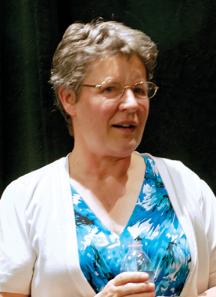Jocelyn Bell Burnell
Spring
2013
Special Feature
Connecting Worlds: The 2012 Quadrennial Physics Congress
Jocelyn Bell Burnell
"The world will not end in 2012" (she was right)
By:Toni Sauncy
Jocelyn Bell Burnell held a captive audience with her closing address, a physics-rich, humorous account of speculations on the end of the world in 2012. The doomsday predictions stemmed from the last date on the Mayan calendar—December 21, 2012. More specifically, at 11:11 GMT.
 The question she explored was how, then, would the world end? Could it be some catastrophic astronomical event or some more geocentric catastrophe? One possibility might be the reversing of the earth’s magnetic field. But the data on that is clear. The earth’s magnetic field appears to be weakening by about 5% each 100 years, and, while we may be headed for a reversal in this direction (a very long time down the road), the Earth will not stop spinning on its axis. Moreover, there is no evidence of any mass extinctions associated with any of the many historical magnetic field reversals, each taking around 5,000 years to complete.
The question she explored was how, then, would the world end? Could it be some catastrophic astronomical event or some more geocentric catastrophe? One possibility might be the reversing of the earth’s magnetic field. But the data on that is clear. The earth’s magnetic field appears to be weakening by about 5% each 100 years, and, while we may be headed for a reversal in this direction (a very long time down the road), the Earth will not stop spinning on its axis. Moreover, there is no evidence of any mass extinctions associated with any of the many historical magnetic field reversals, each taking around 5,000 years to complete.
For astronomical possibilities, she considered a solar disaster, but no Earth catastrophes have been recorded during the over 250 million reversals in the Sun’s magnetic field. Concerns about the alignment of planets in our solar system causing devastating gravitational effects and enormous tidal surges were also ruled out, since the gravitational effects of all the planets combined account for a minute fraction of those from our sun, or even the earth’s moon.
Giving proper consideration to other possible astronomical tragedies in her analysis, Burnell ruled out collisions from asteroids, comets or another legendary celestial object, Nibiru. Nibiru, an alleged planet, was “discovered” by ancient Sumerians. According to legend, Nibiru was scheduled to collide with planet Earth in December 2012. With a highly eccentric orbit about our sun, (>=0.996), there should have been a “close encounter” around 1588 BCE, but there are no records of any observation that might support that the encounter actually happened. Based on the lack of observations, and despite the fantastic lore, Nibiru is science fiction. With Nibiru out of contention for earth-ending events, Burnell noted that the study of astronomy points to an extreme unlikelihood of collisions with other objects, such as asteroids or comets. There was no scientific rationale for any argument that portended an Earth-shattering event in the year 2012.
On a serious note, such misinformation and lack of understanding can be detrimental. Despite all logic and observed fact, many people fall victim to irrational fear, underscoring a need for enhancing numerical and scientific literacy in society. Based on the ease with which a sound piece of science can be twisted into an incredible—and scary—idea, the call for science in society is clear.
More Information
Listen to Dr. Bell Burnell's plenary talk online at: www.spscongress.org/physconprogram/speakers. Audio and video recordings of several other plenary talks are also available.
